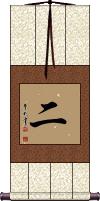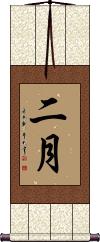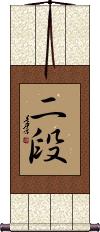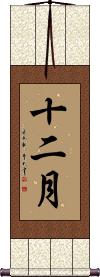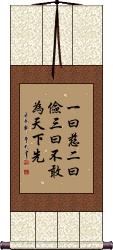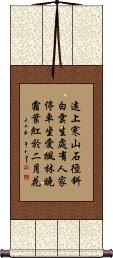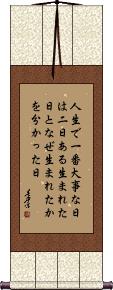Many custom options...
And formats...

二 in Chinese / Japanese...
Buy an 二 calligraphy wall scroll here!
Personalize your custom “二” project by clicking the button next to your favorite “二” title below...
1. Two
2. February
3. Ni-Dan
4. December
8. Daodejing / Tao Te Ching - Excerpt
Two
The number two
二 is the number 2 in Chinese, Korean Hanja, and Japanese Kanji. I have no idea why you would want this as a calligraphy wall scroll but hundreds of visitors search for this number.
In Japanese, this character can be pronounced several different ways depending on context. It can be ni, aru-, futa-, and a few others when combined with other characters.
There's just one way to pronounce this in Chinese. Korean also has just one pronunciation.
February
二月 is the Chinese, Japanese Kanji, and old Korean Hanja for the month of February.
This literally means the “second month” or “second moon” (of the year).
Ni-Dan
二段 is a Japanese Kanji word that literally means “second degree.”
二段 is the second black belt rank in Japanese martial arts.
The first Kanji means two or second in Japanese.
The second Kanji means step, grade, rank, or level.
二段 can also be written as 弐段. This version just uses a more complicated Kanji for the number two.
December
Twelfth Month
十二月 is December, the twelfth month of the year, in Chinese, Japanese Kanji, and old Korean Hanja.
Body and Earth in Unity
身土不二 (Shindofuni) is originally a Buddhist concept or proverb referring to the inseparability of body-mind and geographical circumstances.
This reads, “Body [and] earth [are] not two.”
Other translations or matching ideas include:
Body and land are one.
Body and earth can not be separated.
Body earth sensory curation.
You are what you eat.
Indivisibility of the body and the land (because the body is made from food and food is made from the land).
Going further, this speaks of our human bodies and the land from which we get our food being closely connected. This phrase is often used when talking about natural and organic vegetables coming directly from the farm to provide the healthiest foods in Japan.
Character notes: 身(shin) in this context does not just mean your physical body but a concept including both body and mind.
土 (do) refers to the soil, earth, clay, land, or in some cases, locality. It's not the proper name of Earth, the planet. However, it can refer to the land or realm we live in.
Japanese note: This has been used in Japan, on and off, since 1907 as a slogan for a governmental healthy eating campaign (usually pronounced as shindofuji instead of the original shindofuni in this context). It may have been hijacked from Buddhism for this propaganda purpose, but at least this is “healthy propaganda.”
Korean note: The phrase 身土不二 was in use by 1610 A.D. in Korea, where it can be found in an early medical journal.
In modern South Korea, it's written in Hangul as 신토불이. Korea used Chinese characters (same source as Japanese Kanji) as their only written standard form of the language until about a hundred years ago. Therefore, many Koreans will recognize this as a native phrase and concept.
Good and Evil
Strength and Love in Unity
力愛不二 is a proverb that literally means:
“Strength [and] Love [are] Not Two [separate ideas/concepts/things].”
You'll find this proverb translated from Japanese to English as:
Love and strength are not separate.
Power and love are indivisible.
Strength and love in harmony.
Strength and love stand together.
Old Japanese grammar is quite different than English, and so this proverb says a lot within the brevity of just 4 characters. If you just read these characters directly as “Strength Love Not Two,” you'd probably miss the real meaning.
According to the Swedish Shorinji Kempo Federation, this is the second characteristic of Shorinji Kempo.
This post really explains the concept best in my opinion: Bushido by MS: Riki Ai Fu Ni, which states: "Riki Ai Funi" is the philosophy that power (Riki) and love (Ai) are indivisible. More concretely, a person, who is powerful but does not have love, cannot control and misuse his/her power; on the other hand, a person, who has loved ones but is not powerful enough, cannot protect himself/herself nor loved ones.
Daodejing / Tao Te Ching - Excerpt
Excerpt from Chapter 67
一曰慈二曰儉三曰不敢為天下先 is an excerpt from the 67th Chapter of Lao Tzu's (Lao Zi's) Te-Tao Ching (Dao De Jing).
This is the part where the three treasures are discussed. In English, we'd say these three treasures are compassion, frugality, and humility. Some may translate these as love, moderation, and lack of arrogance. I have also seen them translated as benevolence, modesty, and “Not presuming to be at the forefront in the world.” You can mix them up the way you want, as translation is not really a science but rather an art.
I should also explain that the first two treasures are single-character ideas, yet the third treasure was written out in six characters (there are also some auxiliary characters to number the treasures).
If Lao Tzu's words are important to you, then a wall scroll with this passage might make a great addition to your home.
Mountain Travels Poem by Dumu
This poem was written almost 1200 years ago during the Tang dynasty.
It depicts traveling up a place known as Cold Mountain, where some hearty people have built their homes. The traveler is overwhelmed by the beauty of the turning leaves of the maple forest that surrounds him just as night overtakes the day, and darkness prevails. His heart implores him to stop, and take in all of the beauty around him.
First, before you get to the full translation, I must tell you that Chinese poetry is a lot different than what we have in the west. Chinese words simply don't rhyme in the same way that English or other western languages do. Chinese poetry depends on rhythm and a certain beat of repeated numbers of characters.
I have done my best to translate this poem keeping a certain feel of the original poet. But some of the original beauty of the poem in its original Chinese will be lost in translation.
Far away on Cold Mountain, a stone path leads upwards.
Among white clouds, people's homes reside.
Stopping my carriage I must, as to admire the maple forest at nights fall.
In awe of autumn leaves showing more red than even flowers of early spring.
Hopefully, this poem will remind you to stop, and “take it all in” as you travel through life.
The poet's name is “Du Mu” in Chinese that is: ![]()
![]() .
.
The title of the poem, “Mountain Travels” is: ![]()
![]()
You can have the title, poet's name, and even “Tang Dynasty” written as an inscription on your custom wall scroll if you like.
More about the poet:
Dumu lived from 803-852 AD and was a leading Chinese poet during the later part of the Tang dynasty.
He was born in Chang'an, a city in central China and the former capital of the ancient Chinese empire in 221-206 BC. In present-day China, his birthplace is currently known as Xi'an, the home of the Terracotta Soldiers.
He was awarded his Jinshi degree (an exam administered by the emperor's court which leads to becoming an official of the court) at the age of 25 and went on to hold many official positions over the years. However, he never achieved a high rank, apparently because of some disputes between various factions, and his family's criticism of the government. His last post in the court was his appointment to the office of Secretariat Drafter.
During his life, he wrote scores of narrative poems, as well as a commentary on the Art of War and many letters of advice to high officials.
His poems were often very realistic and often depicted everyday life. He wrote poems about everything, from drinking beer in a tavern to weepy poems about lost love.
The thing that strikes you most is the fact even after 1200 years, not much has changed about the beauty of nature, toils, and troubles of love and beer drinking.
The two most important days in your life...
人生で一番大事な日は二日ある。生まれた日と、なぜ生まれたかを分かった日 is Mark Twain's quote, “The two most important days in your life are the day you are born and the day you find out why” in Japanese.
Note: Because this selection contains some special Japanese Hiragana characters, it should be written by a Japanese calligrapher.
Not the results for 二 that you were looking for?
Below are some entries from our dictionary that may match your 二 search...
| Characters If shown, 2nd row is Simp. Chinese |
Pronunciation Romanization |
Simple Dictionary Definition |
二 see styles |
èr er4 erh aru; aaru(ik) / aru; aru(ik) アル; アール(ik) |
More info & calligraphy: Two(numeric) two (chi: èr); (place-name) Futa Dvā, dvau. Two; dvitīya, second. |
二月 see styles |
èr yuè er4 yue4 erh yüeh futatsuki ふたつき |
More info & calligraphy: Februarytwo months second moon |
二段 see styles |
nidan にだん |
More info & calligraphy: Ni-Dan |
十二月 see styles |
shí èr yuè shi2 er4 yue4 shih erh yüeh kanna かんな |
More info & calligraphy: December(adverbial noun) December; (female given name) Kanna |
善悪不二 see styles |
zenakufuni ぜんあくふに |
More info & calligraphy: Good and Evil |
身土不二 see styles |
shindofuni しんどふに |
More info & calligraphy: Body and Earth in Unity |
一二 see styles |
yī èr yi1 er4 i erh ichini いちに |
one or two; a few; a little; just a bit the first and second; a few; (female given name) Warutsu one or two |
丁二 see styles |
teiji / teji ていじ |
(personal name) Teiji |
七二 see styles |
shichiji しちじ |
(given name) Shichiji |
万二 see styles |
manji まんじ |
(given name) Manji |
丈二 see styles |
takeji たけじ |
(given name) Takeji |
三二 see styles |
mifu みふ |
(personal name) Mifu |
上二 see styles |
jouji / joji じょうじ |
(personal name) Jōji |
下二 see styles |
shimofuta しもふた |
(place-name) Shimofuta |
不二 see styles |
bù èr bu4 er4 pu erh funi ふに |
the only (choice, way etc); undivided (loyalty) {Buddh} advaitam (non-duality); (surname, female given name) Fuji advaya. No second, non-duality, the one and undivided, the unity of all things, the one reality、 the universal Buddha-nature. There are numerous combinations, e. g. 善惡不二 good and evil are not a dualism: nor are 有 and 空 the material and immaterial, nor are 迷 and 悟 delusion and awareness— all these are of the one Buddha-nature. |
与二 see styles |
yoji よじ |
(given name) Yoji |
丑二 see styles |
chuuji / chuji ちゅうじ |
(given name) Chuuji |
世二 see styles |
youji / yoji ようじ |
(personal name) Yōji |
丘二 see styles |
kyuuji / kyuji きゅうじ |
(personal name) Kyūji |
丙二 see styles |
heiji / heji へいじ |
(male given name) Heiji |
丞二 see styles |
jouji / joji じょうじ |
(given name) Jōji |
中二 see styles |
nakani なかに |
second-year of junior high; (surname) Nakani |
丸二 see styles |
maruni まるに |
(surname) Maruni |
丹二 see styles |
tanji たんじ |
(given name) Tanji |
久二 see styles |
hisatsugu ひさつぐ |
(given name) Hisatsugu |
么二 幺二 see styles |
yāo èr yao1 er4 yao erh |
one-two or ace-deuce (smallest throw at dice); a prostitute |
乙二 see styles |
otoji おとじ |
(given name) Otoji |
九二 see styles |
hisatsugu ひさつぐ |
(given name) Hisatsugu |
乾二 see styles |
kenji けんじ |
(given name) Kenji |
亀二 see styles |
kameni かめに |
(given name) Kameni |
Click here for more 二 results from our dictionary
The following table may be helpful for those studying Chinese or Japanese...
| Title | Characters | Romaji (Romanized Japanese) | Various forms of Romanized Chinese | |
| Two | 二 | ni / aru- / futa- | èr / er4 / er / er | erh |
| February | 二月 | futatsuki / nigatsu | èr yuè / er4 yue4 / er yue / eryue | erh yüeh / erhyüeh |
| Ni-Dan | 二段 | ni dan / nidan | ||
| December | 十二月 | juu ni gatsu juunigatsu ju ni gatsu | shí èr yuè shi2 er4 yue4 shi er yue shieryue | shih erh yüeh shiherhyüeh |
| Body and Earth in Unity | 身土不二 | shindofuni / shindofuji | ||
| Good and Evil | 善悪不二 | zenakufuni | ||
| Strength and Love in Unity | 力愛不二 力爱不二 | riki ai fu ni rikiaifuni | ||
| Daodejing Tao Te Ching - Excerpt | 一曰慈二曰儉三曰不敢為天下先 一曰慈二曰俭三曰不敢为天下先 | yī yuē cí èr yuē jiǎn sān yuē bù gǎn wéi tiān xià xiān yi1 yue1 ci2 er4 yue1 jian3 san1 yue1 bu4 gan3 wei2 tian1 xia4 xian1 yi yue ci er yue jian san yue bu gan wei tian xia xian | i yüeh tz`u erh yüeh chien san yüeh pu kan wei t`ien hsia hsien i yüeh tzu erh yüeh chien san yüeh pu kan wei tien hsia hsien |
|
| Mountain Travels Poem by Dumu | 遠上寒山石徑斜白雲生處有人家停車坐愛楓林晚霜葉紅於二月花 远上寒山石径斜白云生处有人家停车坐爱枫林晚霜叶红于二月花 | yuǎn shàng hán shān shí jìng xiá bái yún shēng chù yǒu rén jiā tíng chē zuò ài fēng lín wǎn shuàng yè hóng yú èr yuè huā yuan3 shang4 han2 shan1 shi2 jing4 xia2 bai2 yun2 sheng1 chu4 you3 ren2 jia1 ting2 che1 zuo4 ai4 feng1 lin2 wan3 shuang4 ye4 hong2 yu2 er4 yue4 hua1 yuan shang han shan shi jing xia bai yun sheng chu you ren jia ting che zuo ai feng lin wan shuang ye hong yu er yue hua | yüan shang han shan shih ching hsia pai yün sheng ch`u yu jen chia t`ing ch`e tso ai feng lin wan shuang yeh hung yü erh yüeh hua yüan shang han shan shih ching hsia pai yün sheng chu yu jen chia ting che tso ai feng lin wan shuang yeh hung yü erh yüeh hua |
|
| The two most important days in your life... | 人生で一番大事な日は二日ある生まれた日となぜ生まれたかを分かった日 | Jinsei de ichiban daijina hi wa futsuka aru. Umaretahi to, naze umareta ka o wakatta hi | ||
| In some entries above you will see that characters have different versions above and below a line. In these cases, the characters above the line are Traditional Chinese, while the ones below are Simplified Chinese. | ||||
Successful Chinese Character and Japanese Kanji calligraphy searches within the last few hours...
